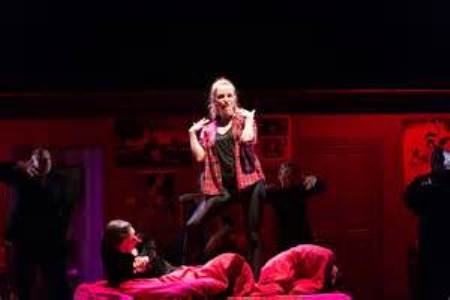Tis Pity She's A Whore (Cheek By Jowl- Bath Theatre Royal)
‘Tis Pity’ gets lost in the confines of a proscenium but still has enough ideas and theatrical vigour to provoke debate.

Cheek by Jowl’s Tis Pity She’s A Whore explodes onto the stage with a dance number that wouldn’t look out of place in a Matthew Bourne dance show. As the audience enters we see Annabella, given a slight, innocent edge by Eve Ponsoby, as the definition of the modern teen lounging on her bed, posters of True Blood (a symbol of the bloodshed and gothic to come) flicking through magazines, her ipod firmly attached to her. As the house lights go down, the music blares out, she begins dancing, and the cast enter one by one until they’re all dancing in unison. It’s a thrilling start to what is the most inventive staging of a classic you’re find.
Make no mistake this Tis Pity isn’t for everyone. On press night the generally older audience sat on their hands watching disapprovingly. Like a lot of the best theatre it is sure to split opinion. This production feels like a young person’s game. A Level students, those studying at university will have a blast. Its theatre that embraces the sheer theatricality of the stage, its rough, thrilling, irrelevant, playful, dangerous, sometimes messy, it occasionally misses its mark with an idea but has another two to throw out seconds later so you’re unable to mind.
Director Declan Donnelly has ditched John Ford’s side plot and keeps the focus solely on the main plot for the two hours traffic of the stage. There is no let up as we see Giovanni (Orlando James) return home from university and consume his incestuous love/lust for his sister Annabella. As in all Jacobean tragedies lust can only lead to destruction. There is a hint of misogyny in Ford’s world. The whore must be punished, and it’s the three women who meet grisly ends. By cutting the last section of the play Donelly allows the men to exit relatively unharmed. With the mostly male cast acting as a Greek chorus, surrounding the action, almost commenting on it, it does frame the plays politics front and centre.
On my second visit to the production, having seen the original at the Barbican in 2012 putting the play behind a proscenium works less well then in a studio. The intimate moments disappear and the performances get lost in the production. The only one who rises above this is Ruth Everett‘s Hippolyta, a glamorous harlot whose revenge plot will provide her undoing.
If on a second viewing it doesn’t prove as intoxicating as the first this Tis Pity still has enough theatrical vigour and ideas to provoke heated debates in the bar afterwards.












